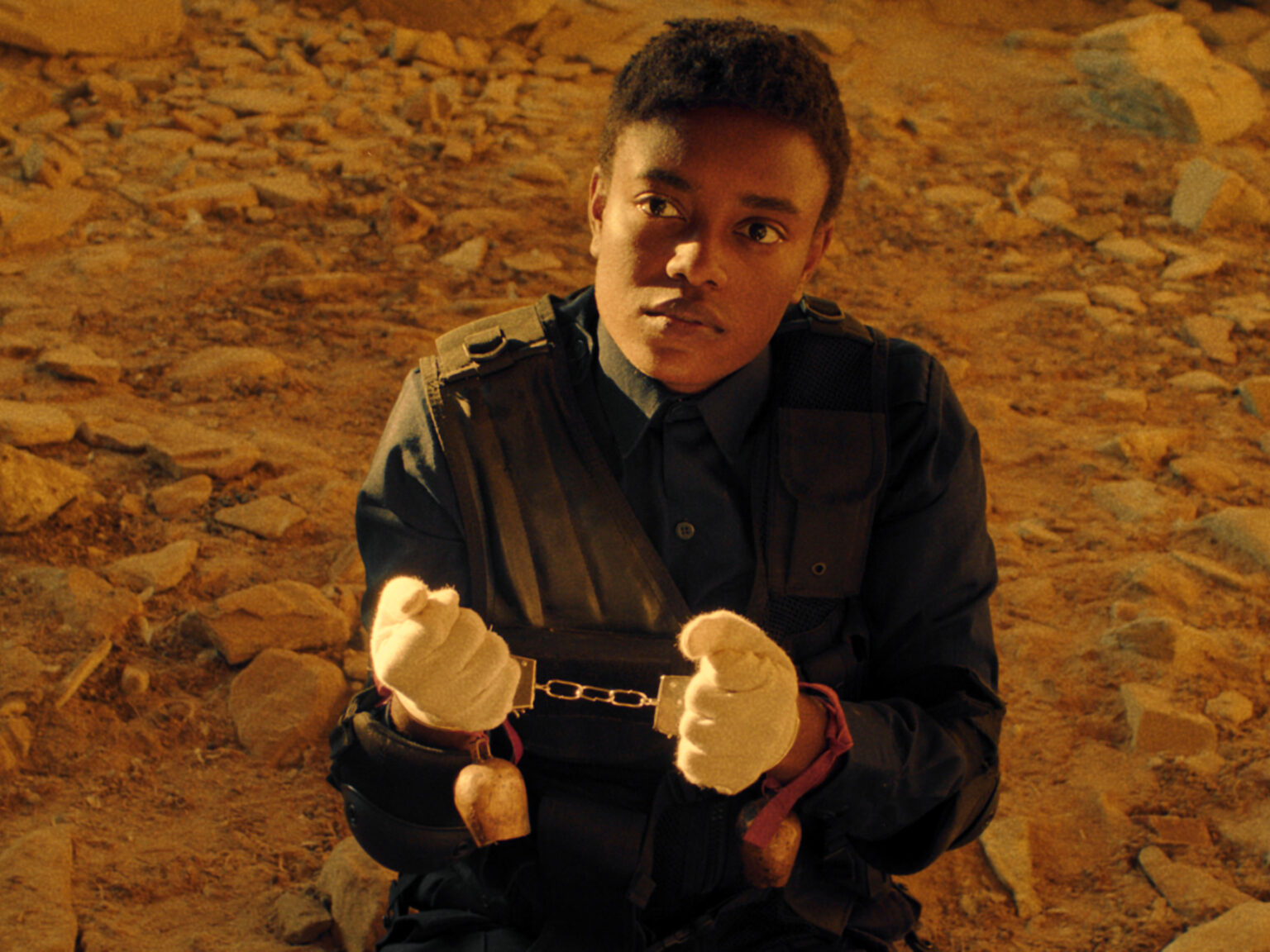Benjamin Deboosere: Robinson Crusoe Is a Dick
’24
Lange Steenstraat 14
B-9000 Gent

Robinson Crusoe Is a Dick © Untitled Production
Lange Steenstraat 14
B-9000 Gent
’24
Lange Steenstraat 14
B-9000 Gent
“With Robinson Crusoe, Daniel Defoe propagated his colonial ideology in the form of a ‘true’ adventure story. His deceitful fairy tale was spread over the world and justified the repression and murder of millions of people. Three hundred years later, oblivious retellings and casual references are still commonplace – in popular culture as well as outside of the mainstream. It’s an indication that this British-European propaganda, about an Englishman shipwrecking on an (un)inhabited island and enslaving a local ‘cannibal,’ is still validated within our cultural ethos. Enough reason to confront this story that enchanted me as a kid but disquiets me as an adult.” (Benjamin Deboosere)
The full title of Deboosere’s debut feature reads: The life and strange surprising adventures of Robinson Crusoe who lived for twenty and eight years all alone on an inhabited island and said it was his. The film premiered in the Bright Future competition at the International Film Festival Rotterdam (IFFR). Benjamin Deboosere (they/their) (b. 1984, Brussels) was part of the 2024 Berlinale Talents. They are currently developing their second fiction feature, The Decapitation of Ousmane Sembene by the Commission for Classification of Cinematography (CCC).
- Preceded by Jean-Marie Straub’s Corneille-Brecht, or Rome, Unique Object of My Resentment (2009)
- Followed by a conversation between Benjamin Deboosere and Raouf Moussa
- Program: Atelier OFFoff (Raouf Moussa)
Jean-Marie Straub & Cornelia Geiser
Corneille-Brecht ou Rome, l’unique objet de mon ressentiment
In leaps of physical color, Cornelia Geiser recites verses from Pierre Corneille’s plays Horace and Othon, followed by extended excerpts from Bertolt Brecht’s 1939 radio play The Trial of Lucullus, in which a Roman General is summoned to the netherworld to stand trial for the crimes and sufferings he has inflicted on commoners and slaves.
Across centuries of Western civilization, Straub and Geiser bridge these texts of different epochs and – in a single corner of a small Parisian apartment – confront the barbarous rulers of ancient Rome, the kings of 17th-century France, the fascists of Europe in the 1930s and 1940s, and, by implication, those in power today. By looking back at these texts from his small Parisian apartment in 2009, Straub unveils their intertextual meanings and makes them resonate with the present.
“Maybe it’s not even a movie,” Straub wondered aloud during a post-screening talk on Corneille-Brecht. Indeed this movie is ‘just’ a woman, Cornelia Geiser, reading a text frontally to the camera in the same corner of Straub’s Parisian apartment (once Danièle Huillet’s mother’s). But the words and their drama and intonation invoke massive friezes, ultimate judgments, conflagrations, the ‘collective hate’ of Rome, “l’unique objet de mon ressentiment” (“the sole object of my resentment”, Corneille), and then goes down even deeper (with a Brecht radio play), down to a Hades where a trial for war crimes is taking place against an imperialist, perhaps the same imperialist, perhaps any imperialist. It would be foolish to call this picture minimalist, for even if its sound were turned off one could be fascinated by the changes of color in wardrobe and sunlight, here effected by jump cuts – yet another cinematographic vein Straub has tapped for both sudden and gradual excitation. Fascination, magic, and belief are part of Straub-Huillet’s cinema too, occurring amid their total opposite – analysis, critical faculty and errant thought –and back again. (Andy Rector)
* We present the new copy from the original MiniDV source material.
* The film exists in three versions – A, B and C. We present version C, the only one with English subtitles (made by Misha Donat and Straub).

Corneille-Brecht © Belva Film
Benjamin Deboosere
Robinson Crusoe Is a Dick
After a shipwreck, the Englishman Robinson Crusoe finds himself stranded on an island. Daniel Defoe’s classic novel has been told many times over, but has never been depicted as critically as in Deboosere’s film. By dismantling the assumptions that the mythical story propagates, the film boldly and irreverently deconstructs one of the colonial landmarks of European literature.
This film is not just an adaptation of Daniel Defoe’s 1719 novel Robinson Crusoe. Rather, it addresses the larger cultural myth that has grown from the premise of the book: a white man ‘civilising’ indigenous inhabitants of an island, and claiming the territory as his own property. In a time today when the call to decolonise the art world and its associated institutions has never been more urgent, Deboosere’s cinematic intervention resonates with a large body of work seeking to destabilise and replace the ideology of imperialism. The result is a singular, subversive film, satirical and surprisingly charming at the same time, which makes sure to pay just as much attention to animals and the natural world as to the follies of human-constructed ‘anthropocene’ history.
The film’s best political weapon is irreverent laughter: the narrative swerves wherever it wishes, the music score serves up mock-military blasts or an a cappella choir, conversing goats offer a moment of reflection, and our connotations of cannibals change forever. Ultimately, nothing is spared here: religion, authority, law and order. Marrying captivating 16mm footage with an incisively satirical and dedicated vision, the film skewers its target. (Adrian Martin)

Robinson Crusoe Is a Dick © Untitled Production

Robinson Crusoe Is a Dick © Untitled Production

Robinson Crusoe Is a Dick © Untitled Production

Robinson Crusoe Is a Dick © Untitled Production

Robinson Crusoe Is a Dick © Untitled Production

Corneille-Brecht © Belva Film